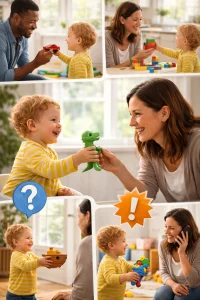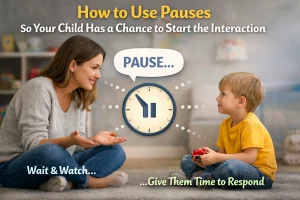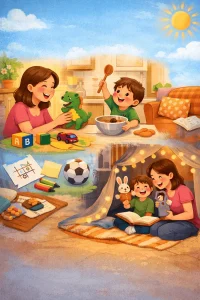Does My Child Need a Speech Evaluation Before 18 Months?
By Rajini D
Last Updated: June 11, 2025
By 18 months, most babies say a few simple words like “mama” or “dada” and respond to their name. If your baby isn’t doing these yet, it may be an early sign of speech delay — and it’s okay to seek guidance.
It’s normal to wonder — “Should my baby be saying more by now?”
Maybe your little one isn’t saying “mama” or “dada,” or doesn’t look when you call their name. And while some people might say, “It’s too early to worry,” deep down, you’re not sure. If you’re feeling confused or anxious about your baby’s speech, you’re not alone — and you’re not overthinking it. Many parents notice something feels “off” long before anyone else does.
The good news? There are clear signs to look for, simple ways to support your child at home, and expert help available if you need it.
Help Your Child Speak Better
Support your child’s speech, language, and confidence with personalized online therapy—fun, expert-led, and from home.
What Are Normal Speech Milestones Before 18 Months?
If you’re wondering whether your baby’s communication is on track, you’re not alone. Many parents keep a close eye on how their little one is growing — especially when it comes to speech and language.
Between birth and 18 months, babies go through exciting changes in how they express themselves. While every child develops at their own pace, here are some common speech milestones before 18 months that many babies meet.
Read More: Speech Development Milestones: Your Child’s Talking Journey
Typical Speech and Communication Milestones (0–18 Months)
| Age Range | Milestone Highlights |
|---|---|
| 0–6 months | Coos, makes gurgling sounds, smiles at voices |
| 6–12 months | Babbles (“ba-ba,” “da-da”), responds to name, uses eye contact |
| 12–15 months | Says simple words (“mama,” “dada”), points to ask or show something |
| 15–18 months | Says 5–10 words, imitates familiar words, follows simple instructions |
What You Might Notice If Things Are On Track
Here are some encouraging signs your baby is developing speech skills:
- Says a few simple words like “mama,” “dada,” or a favorite toy’s name
- Responds when you call their name
- Points or waves to communicate
- Makes eye contact during play or feeding
- Babbles using a mix of sounds like “ba-ba,” “na-na,” or “ga-ga”
- Tries to imitate sounds you make
Red Flags That May Mean Your Baby Needs a Speech Evaluation
It’s normal to wonder if your baby is developing on track — especially when it comes to speech and communication. While every child grows at their own pace, there are certain signs that may suggest a delay. Spotting these red flags for speech delay early can help you take the right steps sooner.
Below are some key things to watch for between 12 and 18 months. If you recognize one or more of these signs in your baby, it doesn’t mean something is “wrong” — but it may be time to explore a gentle, supportive evaluation.
1. Baby Isn’t Saying Any Words Yet
By around 12 to 15 months, many babies say a few words like “mama,” “dada,” or “ball.”
If your baby isn’t saying any words by 16 to 18 months, or mostly makes sounds without meaning, it may be time to look closer.
Even a few meaningful words show progress. A total lack of words may need support.
2. No Eye Contact or Doesn’t Respond to Their Name
Babies usually respond when they hear their name — turning to look, smiling, or reacting in some way.
If your child doesn’t react when you call them or avoids eye contact during play or feeding, it could be a communication red flag.
| Typical Behavior | Possible Concern |
|---|---|
| Looks when name is called | Doesn’t react to voice or name |
| Makes eye contact | Avoids looking at people or faces |
3. Not Using Gestures Like Pointing or Waving
Gestures are a big part of early communication. Babies often point to what they want, wave “bye-bye,” or reach toward people.
If your baby isn’t using gestures by 12 to 15 months, it might signal a delay in how they express themselves — even before they start talking.
4. Baby Seems Quiet Compared to Others
You might notice other children the same age babbling, laughing, or “chatting” to themselves — but your baby seems unusually quiet.
This doesn’t mean your child is behind, but being consistently quiet or silent can sometimes be a red flag.
Trust your instincts. You know your child best — if something feels off, it’s okay to ask questions.
5. Doesn’t Try to Imitate Sounds or Words
Imitation is how babies learn. Around 12 to 18 months, most children try to copy sounds, simple words, or even animal noises.
If your child shows little interest in repeating sounds or copying your words, this could be a sign they need extra support.
What Causes Speech Delay in Babies Under 18 Months?
If your baby isn’t meeting early speech milestones, one of the first questions you might ask is “Why?” While there’s no one-size-fits-all answer, there are a few common causes of speech delay in infants that could be affecting your child’s development.
The good news? Many of these can be identified early — and supported with the right guidance.
Here’s a closer look at some possible reasons your baby might not be talking yet:
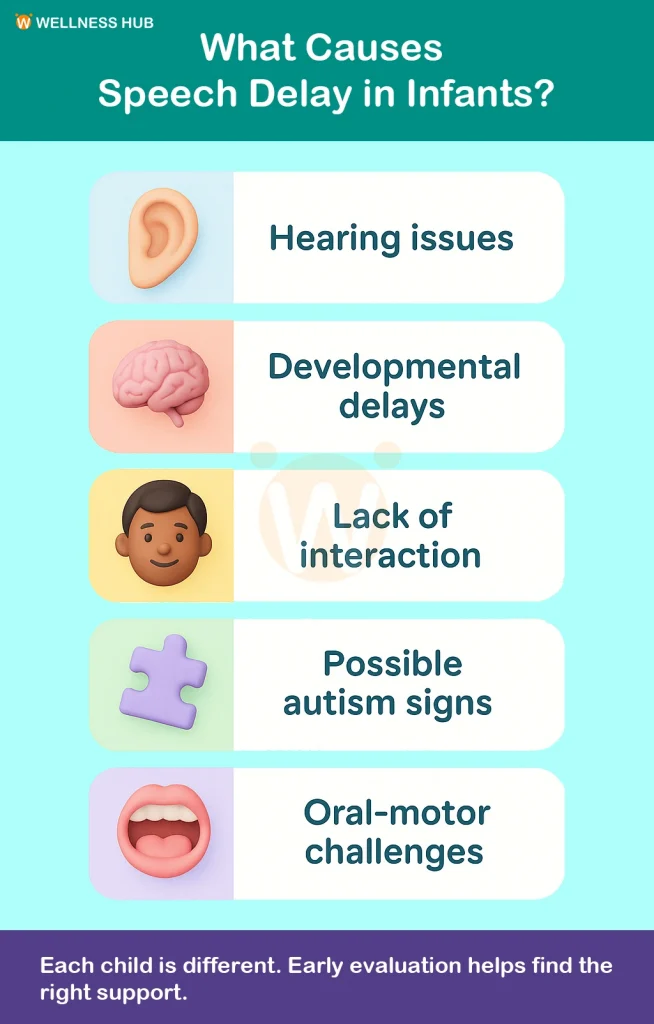
1. Hearing Problems
Babies learn to talk by listening. If they can’t clearly hear sounds around them — like your voice, music, or everyday noises — it becomes harder to learn how to make those sounds themselves.
Signs to watch for:
- Not reacting to loud noises
- Doesn’t turn toward sounds or your voice
- Seems startled only by very loud or close noises
Even minor ear issues, like frequent infections or fluid buildup, can impact speech development. A pediatric hearing test can help rule this out.
2. Developmental Delays
Sometimes, delays in speech are linked to broader developmental differences — such as delays in movement, social interaction, or cognitive skills.
You might notice:
- Baby is slow to sit, crawl, or walk
- Difficulty following simple instructions
- Less interest in toys or people around them
Speech delay may be just one part of a larger pattern — which is why a full developmental evaluation is often helpful.
3. Lack of Interaction or Exposure
Babies need lots of back-and-forth communication — even before they start using words. A quieter environment, limited face-to-face time, or excess screen time can all reduce the chances your child has to build those skills.
Healthy habits that support speech:
- Talking and singing to your baby daily
- Reading picture books together
- Minimizing screen time
- Playing face-to-face games (like peek-a-boo or “Where’s the ball?”)
Even small, everyday moments make a big difference.
Signs Related to Autism Spectrum
Some children with speech delays may also show early signs of autism. These signs don’t confirm a diagnosis, but they can be important to notice early.
Possible early autism signs include:
- Lack of eye contact
- Doesn’t respond to name
- Limited gestures (like pointing or waving)
- Repetitive movements (like hand flapping or spinning toys)
- Prefers being alone or doesn’t seek interaction
If you notice several of these along with speech delay, a developmental screening may help you understand what’s going on.
Oral-Motor Challenges
Sometimes, babies have trouble using the muscles in their mouth, lips, or tongue the way they need to for speech. This can be due to low muscle tone, coordination issues, or other oral-motor difficulties.
Possible signs:
- Trouble sucking or chewing
- Excessive drooling
- Difficulty making certain sounds, even if they try
In such cases, early support from a speech-language pathologist — like those at Wellness Hub — can help improve both feeding and communication skills.
When Should I Take My Baby for a Speech Evaluation?
If you’ve been asking yourself, “Should I wait a little longer… or is it time to get help?” — you’re not alone. Many parents feel this way when their baby isn’t hitting the typical speech milestones. And the truth is: if you’re concerned, it’s always okay to look into it.
1. Trust Your Instincts — You Know Your Baby Best
As a parent, you notice the little things — what your child enjoys, how they react, how they communicate. If something feels off, even if others say “just wait,” your gut is worth listening to.
Common reasons parents seek a speech evaluation:
| Concerned About… | Because… |
|---|---|
| No words by 15–18 months | Most babies say 1–5 words by this age |
| Doesn’t respond to name or eye contact | These are early signs of social-communication development |
| Baby isn’t pointing, waving, or babbling | Gestures and sounds come before words |
| Baby seems quiet or uninterested in sounds | Speech starts with engagement and interaction |
2. Early Help is Always Better Than Waiting
It’s tempting to wait and see — but early support can make a huge difference. Research shows that early intervention leads to better communication outcomes later on. That means fewer struggles when your child reaches preschool or school age. And even if your child catches up on their own, a simple evaluation can give you peace of mind.
A speech evaluation doesn’t mean something is wrong — it just helps you understand where your child stands and what they may need.
3. Not Sure If It’s Time? Here’s a Quick Checklist
If you check two or more of the boxes below, it may be time to schedule a speech evaluation:
- My baby isn’t saying any words by 16–18 months
- Doesn’t react when I say their name
- Rarely points, waves, or uses gestures
- Makes very few sounds or babbles
- Seems more quiet than other children their age
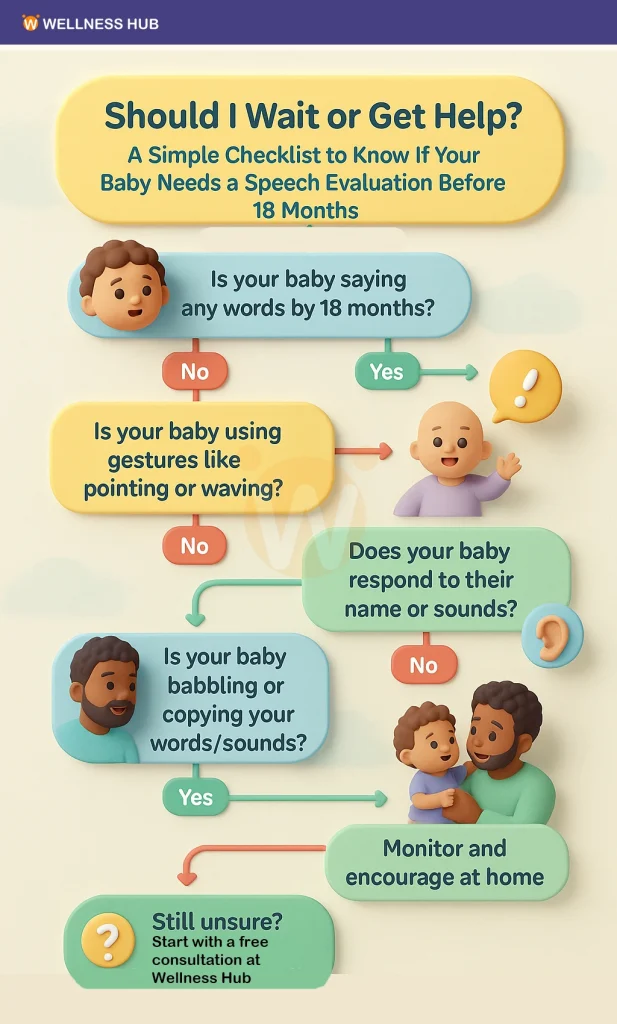
What Can Parents Do at Home to Support Early Speech?
If you’re worried your baby isn’t talking yet, you might be wondering, “What can I do right now to help?” The good news is — you don’t need fancy tools or hours of training. Some of the most powerful ways to support your baby’s speech happen right at home, during everyday moments.
Here are five simple, research-backed strategies you can start using today to support speech development at home — in ways that feel natural and loving.
1. Talk to Your Baby During Daily Activities
Everyday routines are full of opportunities to talk. Describe what you’re doing as you change a diaper, cook dinner, or give a bath.
Example:
“Now we’re putting on your socks! One sock… two socks! All done!”
Babies learn words by hearing them often in real-life situations — and your voice is their favorite teacher.
2. Read Picture Books Every Day
Reading isn’t just about stories — it builds vocabulary, listening, and bonding. Choose simple books with big pictures and clear labels.
Try this:
- Point to the pictures and name them out loud
- Pause to let your baby look or respond
- Repeat the same book daily — repetition helps words stick!
You don’t need to read every word — just talking about the pictures is great for early speech.
3. Imitate and Repeat Their Sounds
When your baby babbles or makes sounds, copy them back — and wait to see what happens. This back-and-forth builds the rhythm of conversation, even before real words come.
For example:
If your baby says “ba-ba,” you say it too — then add something: “Ba-ba? Ball? Do you want the ball?”
4. Use Simple Words Over and Over
Babies need to hear the same word many times before they use it. Stick with short, easy words that match what they want or see.
Helpful words to repeat:
- “More”
- “Up”
- “Mama/Dada”
- “Milk”
- “Go”
- “Open”
Keep your sentences short and slow — it makes it easier for your child to follow and copy.
5. Play Face-to-Face Games Without Screens
Real interaction is how babies learn to communicate. Games like peek-a-boo, singing songs, or passing a ball back and forth teach turn-taking, gestures, and attention — all essential for speech.
Try to minimize screen time during these early stages. Live, responsive interaction matters more than passive watching.
Conclusion
If your baby isn’t talking yet, it’s okay to feel worried. But you don’t have to wait and see. Early support can make a big difference in how your child learns to speak and connect. At Wellness Hub, our expert therapists offer gentle, online speech evaluations for babies under 18 months. It’s simple, stress-free, and starts with a free consultation.
Frequently Asked Questions:
1. Is it normal for a baby to not talk at 18 months?
By 18 months, many babies say simple words like “mama,” “dada,” or names of familiar things like “ball” or “milk.” If your baby isn’t saying any clear words yet, it could be a sign of a speech delay. Every child is different, but if there are no words at all by 18 months, it’s a good idea to speak to a speech-language therapist. Early evaluation helps understand whether your baby is just taking a little longer — or if extra support is needed.
2. When should I take my baby for a speech evaluation?
You should consider a speech evaluation if your baby is:
- Not saying any words by 15 to 18 months
- Not babbling much after 12 months
- Not responding to their name or looking when called
- Not using gestures like pointing or waving
It’s always okay to check early. Even if there’s no problem, the evaluation can give you reassurance. And if there is a delay, early help can make a big difference.
3. What are early signs of speech delay in babies?
Some common red flags for speech delay include:
- No clear words by 18 months
- No babbling by 12 months
- Doesn’t point, wave, or use gestures
- Doesn’t look when you call their name
- Seems quieter than other children the same age
- Doesn’t try to copy sounds or words you say
If you notice a few of these signs, it’s worth checking in with a professional.
4. Can a baby have speech delay even if they hear well?
Yes. Not all speech delays are caused by hearing issues. Some children can hear perfectly but still struggle with speech due to other reasons — such as developmental delays, low social interaction, or difficulty using the muscles for speech. A full evaluation can help identify the exact reason behind your child’s delay.
5. Does speech delay mean my baby has autism?
Not necessarily. While speech delay can be one of the signs of autism, many children with delayed speech do not have autism. However, if your baby also avoids eye contact, doesn’t respond to their name, doesn’t show interest in people or toys, or repeats the same actions often — these may be early autism signs. Only a qualified expert can assess this properly. If you notice a combination of these signs, don’t wait to get help.
6. Can I help my baby talk more at home?
Yes! There’s a lot you can do as a parent to support speech development at home. Here are some easy tips:
- Talk to your baby during daily routines like dressing or feeding
- Read simple picture books every day
- Copy your baby’s sounds and wait for a response
- Repeat short words often, like “ball,” “milk,” or “up”
- Play face-to-face games like peek-a-boo and songs with actions
These small actions help your baby learn how speech works — even before they say their first words.
7. Should I wait and see if my baby catches up?
It’s common to hear “wait and see,” but waiting too long can delay needed support. If your baby is showing signs of speech delay, early evaluation can give you answers and peace of mind. Some children do catch up on their own, but others may benefit from early speech therapy. Starting early can help your child communicate better and build stronger connections with you.
8. What happens in a baby’s speech evaluation?
A baby’s speech evaluation is gentle and playful. The therapist may:
- Watch how your baby responds to sounds or their name
- See how they use gestures or facial expressions
- Check if they babble, imitate, or try to communicate
- Talk to you about your child’s development and your concerns
It’s not a test — it’s a way to understand how your child is growing and what they might need next.
9. Is online speech therapy good for babies?
Yes! Online speech therapy can be very helpful — especially when it’s designed for babies and young children. At Wellness Hub, our therapists work closely with parents, showing you how to support your child through simple daily routines. Sessions are done at home, where your baby is comfortable. You’ll learn how to turn playtime and routines into learning moments — guided by experts.
10. How do I book a speech evaluation for my baby?
Booking a speech evaluation is simple. At Wellness Hub, you can start with a free consultation. We’ll listen to your concerns, ask about your baby’s development, and help you decide if therapy is the right next step. No pressure — just support and answers from caring professionals who understand what you’re going through.
About the Author:
Rajini Darugupally
M.Sc., Speech-Language Pathologist (9+ years of experience)
Rajini is a passionate and dedicated Speech-Language Pathologist with over 9+ years of experience, specializing in both developmental speech and language disorders in children and rehabilitation in adults. Driven by a desire to empower each individual to find their voice, Rajini brings a wealth of experience and a warm, genuine approach to therapy. Currently, at Wellness Hub, she thrives in a team environment that values innovation, compassion, and achieving results for their clients.
Book your Free Consultation Today
Parent/Caregiver Info:
Client’s Details:
* Error Message
